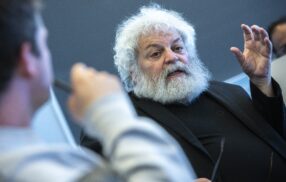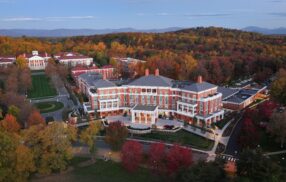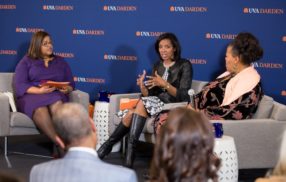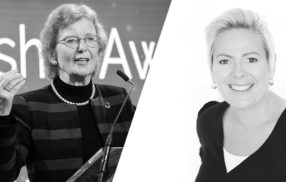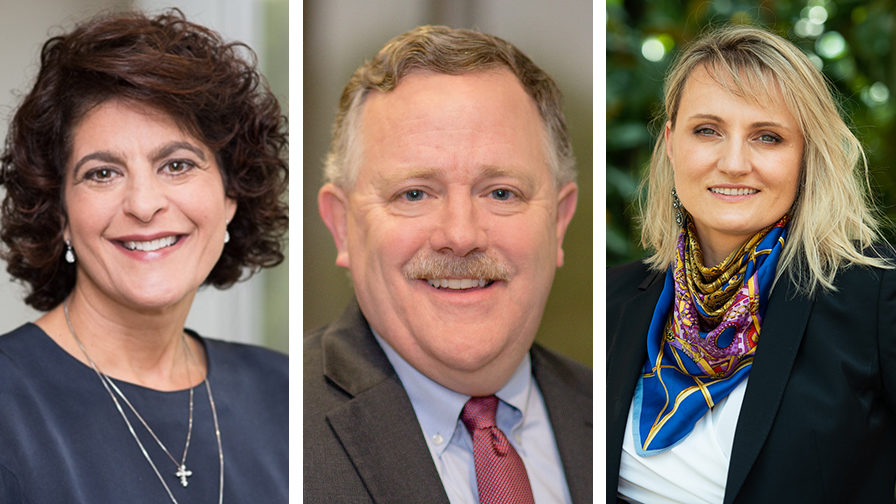
GEICO Execs Examine the Modern Workplace Amid COVID at UVA Darden’s Leadership Unscripted
By Dave Hendrick
The COVID-19 pandemic has upended the way much of the world lives and works, and it’s unclear both when a return to normal may occur and what that return may look like.
What practices, many born out of necessity, will carry over to a post-COVID world? Which will be dispatched as soon as possible?
At a virtual Leadership Unscripted event hosted by the University of Virginia Darden School of Business and moderated by Professor Elena Loutskina on 28 October, a pair of executives from GEICO offered a snapshot into pandemic preparations and execution at one of the world’s largest insurance companies.
The event, titled The Modern Workplace: From Grasping for Straws to a Strategic Balance, came as COVID-19 case numbers continue to rise across the U.S. and much of the world, making the timeline for a return to normalcy largely unknowable.
GEICO executives Maria Scarangella, vice president of talent acquisition and onboarding, and Steve Smith, vice president of information technology, recalled the unusual time more than six months ago, when the organization was among those suddenly forced to pivot to a largely work-from-home environment. A pilot to move a selection of employees to remote work soon escalated to roughly 40,000, with all the logistical complications a move of that scale entailed.
“We knew sending everyone home that we didn’t have a perfect solution,” said Smith, noting the challenges of going from about 100 tightly controlled “end points” at call centers to 40,000 disparate end points with huge variability.
In the early days, the technology staff seemed to spend its days setting up for the new normal and the nights troubleshooting, Smith said.
“It was one step and one foot in front of another,” said Smith.
Scarangella suggested the company’s culture of great management led to success. She said the relationships of leaders, many of whom have grown from within the company, allowed the relatively quick, if not always easy, pivot.
“Everyone knew we were working toward something that was really important to our associates and customers,” said Scarangella. She described the attitude as pervasive throughout the workforce, which includes enormous diversity among roles and responsibilities. “There was not one leader in the company who said, ‘I’m stepping out.’ They just said, ‘Tell me what you need.’”
The company now faces the challenge of fortifying and renewing those personal bonds that may not be as strong in the virtual environment, particularly for new hires, and encouraging both results and innovation in a world where the work environment for some may simply not be as productive as a traditional office.
Loutskina, who like many at the Darden School has seen key components of school taken to the virtual realm since March, said maintaining the human connection amid the pandemic appeared to be one of the trickiest problems to solve.
“The technology is easy. It’s building the connections and relationships that’s what’s really hard,” Loutskina said. “For me, the biggest lesson is how important that human interaction is to make any organization successful.”
The Darden professor said she was grateful to work at an institution with a strong baseline of community support.
Both Smith and Scarangella said the initial weeks and months instilled a new sense of flexibility for a company that tended to be process-oriented and intentional about fully testing changes. There was much more willingness to try new things, even if failure was a possibility. That trend may continue, even when COVID-19 fades, they said.
“We have shown ourselves that we can move faster,” said Scarangella. “Not everything has to be perfect before we try it. We are going to try some things and not everything is going to work, but we are going to learn from it.”
Added Smith, “Fear of implementing change quickly has been dismissed.”
The University of Virginia Darden School of Business prepares responsible global leaders through unparalleled transformational learning experiences. Darden’s graduate degree programs (MBA, MSBA and Ph.D.) and Executive Education & Lifelong Learning programs offered by the Darden School Foundation set the stage for a lifetime of career advancement and impact. Darden’s top-ranked faculty, renowned for teaching excellence, inspires and shapes modern business leadership worldwide through research, thought leadership and business publishing. Darden has Grounds in Charlottesville, Virginia, and the Washington, D.C., area and a global community that includes 18,000 alumni in 90 countries. Darden was established in 1955 at the University of Virginia, a top public university founded by Thomas Jefferson in 1819 in Charlottesville, Virginia.
Press Contact
Molly Mitchell
Associate Director of Content Marketing and Social Media
Darden School of Business
University of Virginia
MitchellM@darden.virginia.edu


